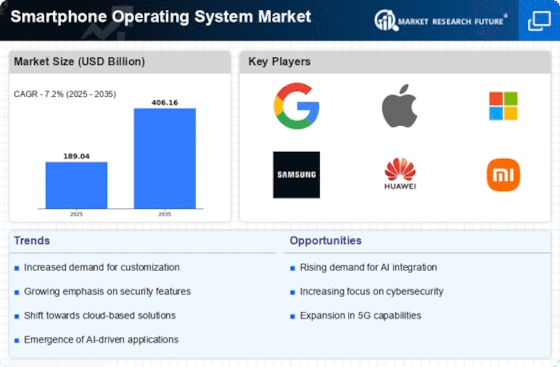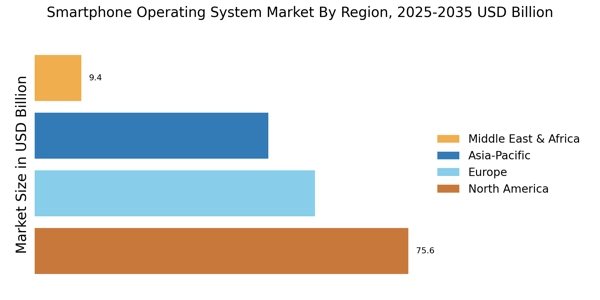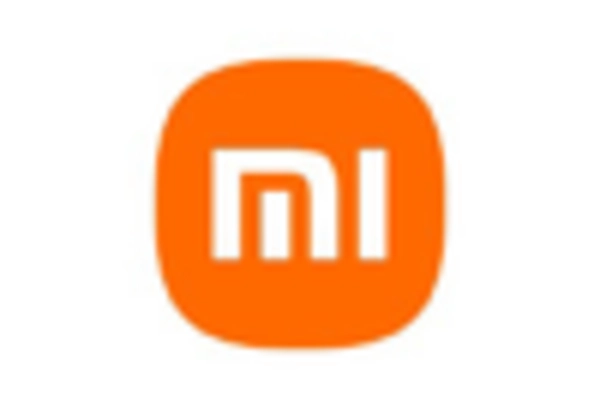Growing Adoption of IoT Devices
The proliferation of Internet of Things (IoT) devices is significantly influencing the Smartphone Operating System Market. As more consumers integrate smart home devices and wearables into their daily lives, the need for operating systems that can seamlessly connect and manage these devices becomes paramount. In 2025, it is projected that the number of connected IoT devices will surpass 30 billion, creating a vast ecosystem that smartphone operating systems must navigate. This interconnectedness necessitates robust security features and user-friendly interfaces, which could drive innovation within the Smartphone Operating System Market. Companies that prioritize compatibility with IoT ecosystems may find themselves at a distinct advantage, potentially capturing a larger share of the market.
Rising Demand for 5G Connectivity
The increasing demand for 5G connectivity is a pivotal driver in the Smartphone Operating System Market. As consumers and businesses alike seek faster and more reliable internet access, smartphone manufacturers are compelled to integrate advanced operating systems that can fully leverage 5G capabilities. This trend is evidenced by the fact that, as of 2025, over 50% of smartphone users are expected to own 5G-enabled devices. Consequently, operating systems that support enhanced data speeds and low latency are likely to gain a competitive edge. The Smartphone Operating System Market must adapt to these technological advancements, ensuring that their platforms are optimized for 5G functionalities, which could lead to a surge in user engagement and satisfaction.
Shift Towards Open Source Platforms
The shift towards open source platforms is reshaping the Smartphone Operating System Market. Open source operating systems, such as Android, offer flexibility and customization that appeal to both developers and consumers. This trend is underscored by the fact that open source platforms account for approximately 75% of the smartphone operating system market share as of 2025. The collaborative nature of open source development fosters innovation, allowing for rapid updates and enhancements that proprietary systems may struggle to match. As a result, the Smartphone Operating System Market is likely to see increased competition, with developers striving to create unique applications and features that cater to diverse user needs.
Integration of Advanced Security Features
The integration of advanced security features is becoming increasingly vital in the Smartphone Operating System Market. With rising concerns over data privacy and cyber threats, consumers are demanding operating systems that prioritize security. As of 2025, it is estimated that over 60% of smartphone users consider security features a top priority when choosing a device. This trend compels operating system developers to implement robust security measures, such as biometric authentication and end-to-end encryption. Consequently, the Smartphone Operating System Market is likely to witness a surge in innovations aimed at enhancing user security, which could ultimately influence purchasing decisions and brand reputation.
Emphasis on User Experience and Interface Design
The emphasis on user experience and interface design is a critical driver in the Smartphone Operating System Market. As consumers become more discerning, the demand for intuitive and aesthetically pleasing interfaces continues to rise. In 2025, studies indicate that nearly 70% of users prioritize user experience when selecting a smartphone, making it a key factor for manufacturers. Operating systems that prioritize seamless navigation, personalization, and accessibility are likely to resonate more with consumers. This focus on user-centric design could lead to increased brand loyalty and higher sales within the Smartphone Operating System Market, as companies strive to differentiate themselves in a crowded marketplace.

















